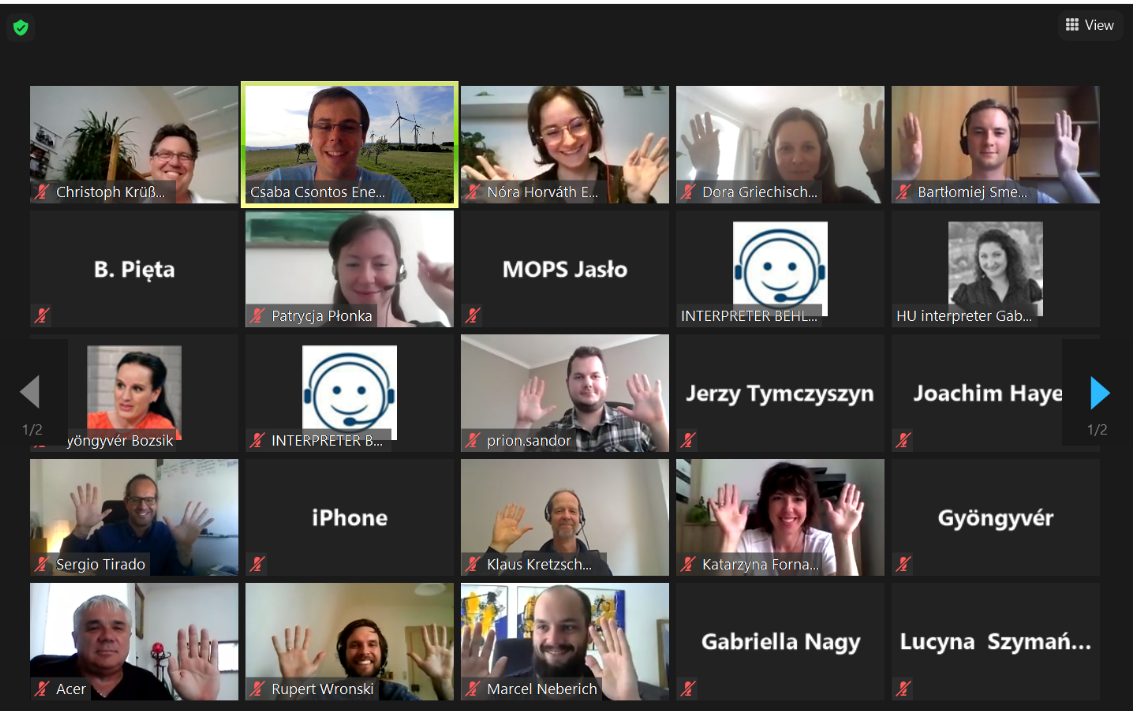 The third and final workshop and virtual site visits of the EnPover Municiplites project took place on 24th June 2021. This time the event was hosted by Energiaklub Climate Policy Institute & Applied Communications, Hungary. Despite the best efforts of the organisers, due to travel restrictions caused by the COVID-19 pandemic, this event had to be held online as well. Nevertheless, a good number of municipal experts, local decision-makers and other stakeholders from Poland, Germany and Hungary and other European countries joined in. The event consisted of interactive sessions and a substantial body of scientific research presentations. The programme was made even more unique and enjoyable by highly interesting and innovative Hungarian and German virtual field visits, which furthered the active engagement of the participants.
The third and final workshop and virtual site visits of the EnPover Municiplites project took place on 24th June 2021. This time the event was hosted by Energiaklub Climate Policy Institute & Applied Communications, Hungary. Despite the best efforts of the organisers, due to travel restrictions caused by the COVID-19 pandemic, this event had to be held online as well. Nevertheless, a good number of municipal experts, local decision-makers and other stakeholders from Poland, Germany and Hungary and other European countries joined in. The event consisted of interactive sessions and a substantial body of scientific research presentations. The programme was made even more unique and enjoyable by highly interesting and innovative Hungarian and German virtual field visits, which furthered the active engagement of the participants.
Using the MURAL platform, participants were first invited for a short warm-up session to get into the rhythm of the event. Afterwards, Partycja Plonka, Conrotium Leader of the EnPover Municipalities project, presented the collection of good practices on energy poverty alleviation and the Toolkit for Municipalities which is considered one of the key products of the EnPover project. If properly implemented and used, the proposed actions of the Toolkit can make a real difference in alleviating energy poverty at the local level and improving the comfort of people suffering from energy poverty.
Our next presenter was Marlies Hesselman, who presented a fascinating free online map (www.covidenergymap.com) of the COVID-19 epidemic and subsequent energy poverty policies around the world, with a special focus on the European context and the partner countries involved in the project. After a refresher, Dr Sergio Tirado Herrero presented the concerns of electricity poverty based on his field experiences in Hungary and preliminary results of his research focusing on the attitudes towards prepayment meters. The expert's presentation sparked so much attention that a long and productive exchange of views ensued. José Campos from ELTE continued the series by showing the results of a multi-year research study on the area of Bükkalja, Hungary, focusing on fuel poverty, redinetal energy consumption survey and heating energy mix.
Mapping energy poverty was a key focus of this event. The online tools (Power-Target, Power-Act: https://powerpoor.eu/toolkit ) developed within a H2020 project called PowerPoor and their usage, utlilization were presented by Eleni Kanellou. This was followed by a short 5-5 minute presentation by representatives of the three flagship municipalities participating in the EnPover project. Particpants focused on the current local situation of energy poverty, their part in the EnPover communication campaign and the future plans of the municipality. Balázs Tömöri, mayor of Piliborsjenő (Hungary) spoke about the comprehensive social mapping planned in the municipality. Klaus Kretzschmar, from Nuremberg (Germany), shared his experiences and the communication campaign carried out during the project. While Katarzyna Fornal-Urbańczy from Zamość (Poland) gave an overview of the current status of energy poverty in her municipality and highlighted the important role of local educators in raising awareness.
The morning programme was rounded off with an interactive session on MURAL, where all participants were able to join in and explain, among other things, what they had learned about energy poverty during the EnPover project.
After the lunch break, the Hungarian and German online field visits followed. Dr. Kirsztina Jász and Nóra Feldmár presented in detail a community building and stove construction initiative in a tiny little village in the south of Hungary, Ág. The presentation was interspersed with a streetview field trip and thought-provoking videos on local energy poverty. Following the Hungarian site visit, Barbara Kalker gave a fascinating presentation on the experiences and further opportunities of the highly successful Stormspar-Check project. The event ended with the acknowledgement from the project partners on the active involvement of the many stakeholders, experts and civilians being with the project since the end of 2019. and inspiring words of encouragement for actions against energy poverty.
Polish/English and Hungarian/English interpretation was available throughout the workshop, which helped to overcome language barriers and to bring more participants into the energy poverty discussion, thus raising the quality of the event.
To download the presentations and, please use the link you received in the email sent after the event. If you didn't participate in the event but are interested in this topic, please contact with our office: This email address is being protected from spambots. You need JavaScript enabled to view it..
- Presentation of the Toolkit and good practice booklet developed within the EnPover project , Patrycja Płonka, Polish Network "Energie Cités” (PNEC)
- On 'electricity poverty' precarious connections and prepayment meters in Hungary , Dr Sergio Tirado-Herrero, Uniwersytet w Barcelonie
- Introduction of household energy consumption field survey and heating energy mix at Bükkalja , José Campos, Uniwersytet ELTE
- Presentation of effective measures for energy poverty alleviation on the example of Ág city , Nóra Feldmár & Krisztina Jász; Habitat for Humanity Węgry
- Presentation of the energy saving and energy efficiency consulting programme at Stadtwerke München , TBC, Stadtwerke München





